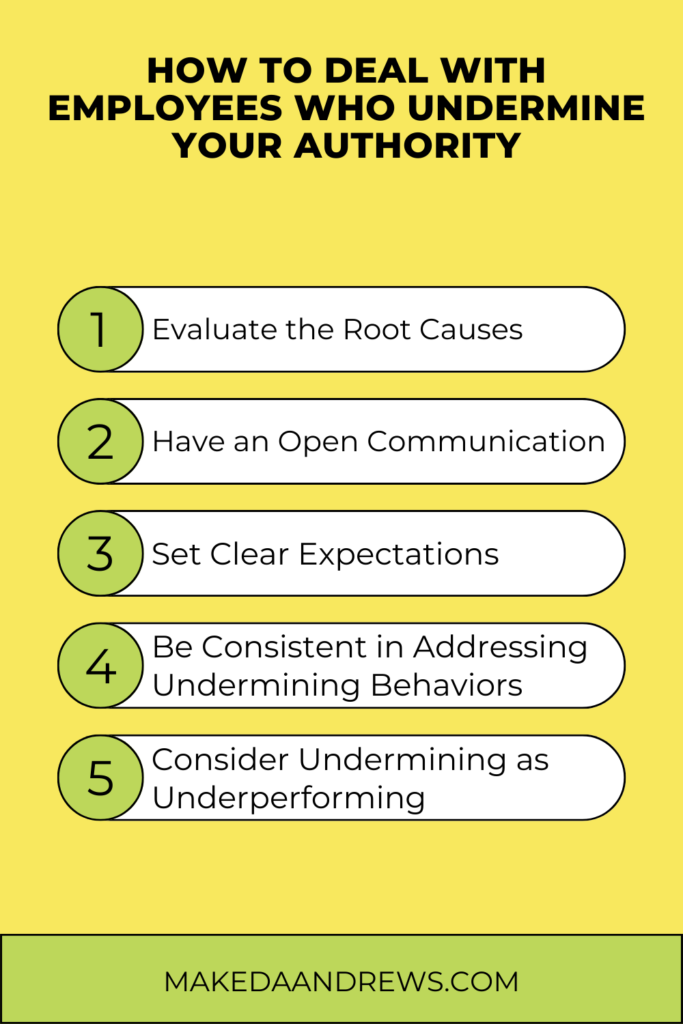How To Deal With Employees Who Undermine Your Authority.
Hi, I'm Mak. I'm a leadership coach for new managers who knows what it's like to be filled with overwhelm, self-doubt and terror that I’d let everyone down. My Story
FREE MICROCAST
How to Become an Effective Leader so You Can Build a High Performance Team
Learn how to delegate with confidence, navigate those tricky conversations (even for introverts!), and finally stop relying on Google to do your job.
Netflix < MakTV
THE YOUTUBE CHANNEL
No but really. This is the kinda content that’s actually healthy to binge. In fact, you become more of an awesomesauce manager with every video you watch.
Updated December 31st, 2024
I know the feeling of starting a new role as a team leader and being excited about new responsibilities, only to have a bump in the road and find out one of your team members is going behind your back and trying to undermine you. I hate to break it to you, but the reality is it’s not all rainbows and unicorns in senior management.
So, if you’re feeling defeated because you have an employee undermining you, stick to the end because, in this blog post, I will teach you effective strategies to overcome this situation.
Dealing With Employees Who Undermine Your Authority
First, let me start by saying from the bottom of my heart that I’m so sorry you are going through this. It’s an awful situation that might even have you questioning your leadership skills.
However, there’s one thing I want you to keep in mind: You’re in that role for a reason and can overcome this situation in your favor. I want you to take this as an opportunity to see what you can learn and apply in your new role and how to turn things around.
Now, the first step is to equip you with the best tools for your journey, so make sure to snag my five-pillar framework to become an effective leader with a high-performing team and save a seat for my FREE training!

The second step is identifying what an undermining behavior looks like.
Undermining behavior occurs when someone’s actions hurt another person’s reputation, progress, or confidence. These actions can have consequences for the team and may lead to a toxic environment. Some of the most common traits include:
- Team members going around or above you: If they are reaching out to your manager directly or other team members, it might be a way of saying your figure doesn’t represent authority for them.
- They gossip about you: People will have opinions about everything you do. But it’s a whole other thing when a team member constantly gossips because not only is that a lack of respect, but it can also promote a toxic work environment.
- They unfairly blame you: If you find yourself dealing with situations in which you’re always found guilty no matter what you do, this might be a toxic trait you want to wipe immediately from your team.
- They’re unnecessarily competitive: It might be a sign of toxic behavior if your team members constantly need to prove themselves they’re better than you or someone else and can “win” the challenges.
- They withhold information to make you look bad: Communication is the core of leadership, so when your employees do not provide enough feedback or the information you need, it’s time to address the problem. Remember that these disruptive behaviors can lead to misunderstandings and a negative work environment.
The good news is there’s a light at the end of the tunnel.
As we mentioned in the beginning, you can do something to turn around these behaviors and make the most out of these challenges. I like to break this down into a 5-strategy plan:

#1. Evaluate the Root Causes
Undermining behaviors are just a symptom that something else is happening, so to deal with these situations, you need to dig deeper and focus on the root causes rather than the problems.
At the core, an undermining behavior might be a lack of trust. Whether your team members don’t trust your decisions, leadership, or competence, something is going on that’s blocking them from fully being confident in your skills as a leader.
If this is your case, I recommend reflecting on what might be causing the lack of trust. Perhaps a lack of communication, a misunderstanding, or a previous experience impacted them. And because you didn’t address it back then, it left them doubting your capacities as their leader.
Whatever it is, try to identify the root cause and consider the right approach to address this issue.
#2. Have an Open Dialogue.
I know communication is a struggle for most of us, especially when dealing with challenging situations like undermining behaviors, because we all hate conflict and want to avoid it as much as possible. However, in order to solve these problems, we must have an open and constructive dialogue with this person to understand what’s reinforcing their undermining behavior.
Promoting an open and honest conversation can help you understand their perspective and the triggers behind their actions.
Sometimes, underlying issues may be a personal trait of your team members, and they might not even realize the impact of their actions, or it can be just a simple misunderstanding.
Regardless, don’t stay quiet. Remember that” whatever we don’t address, we’re giving permission to.” So, instead of allowing it to happen by staying silent, address the elephant in the room and find a solution to overcome this behavior.

#3. Set Clear Expectations.
I never get tired of talking about setting clear expectations in leadership because this area is usually the crack of many issues. So, when dealing with employees who undermine your authority, define and clearly communicate your expectations for your team. Let them know their roles, responsibilities, and boundaries, and reinforce how these expectations align with the team’s goals and values.
Setting clear expectations will give your team members a framework to work within and a place to be held accountable for their actions.
#4. Be Consistent in Addressing Undermining Behaviors.
If you want to eliminate these behaviors from your team, you have to stay consistent. And by that, I mean not letting the behavior slide once or twice. Being consistent and maintaining your authority as a team leader can help you develop a healthier work environment in which you’re all focusing on moving forward despite the challenges you may encounter.
Always remember, when you see someone acting with an underlying behavior, hold them accountable to help them understand the consequences of their actions.

#5. Consider Employees Who Undermine Your Authority as Underperforming.
We tend to think performance issues only relate to our operational tasks. Still, they also encompass how we act, so when an employee actively undermines your authority, they may also be underperforming. As a team leader, it is your responsibility to put a stop to these situations.
So, when you detect a “rotten apple” in your team, don’t wait until it rotten the whole barrel. Address it promptly and take the necessary actions to prevent it from happening again.
After all this information, remember these important takeaways:
- Address things promptly and direct and don’t be afraid to have these difficult conversations.
- Monitor the behavior and take action if things don’t improve.
- Ask for help. It’s better when you reach out to your mentor or managers for guidance on this matter.
Remember that you’re capable of dealing with these situations and will overcome them with time and effort.
Comment below with any questions you have about employees who undermine your authority, save this article for future reference, and share it with your colleagues who might be facing this situation. Let them know they’re not alone and can overcome these challenges, which will broaden their experience as a first-time team leader.

February 14, 2024
Thank you for all this guidance. Not only did you instruct me, you comforted me. I believe I can deal with the one undermining my authority properly now.